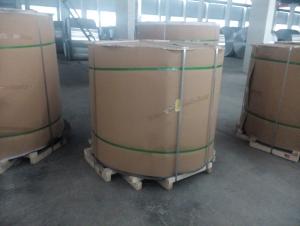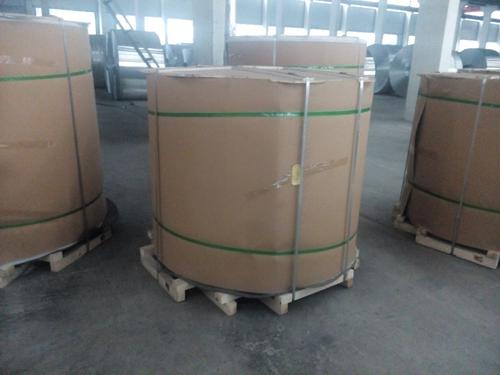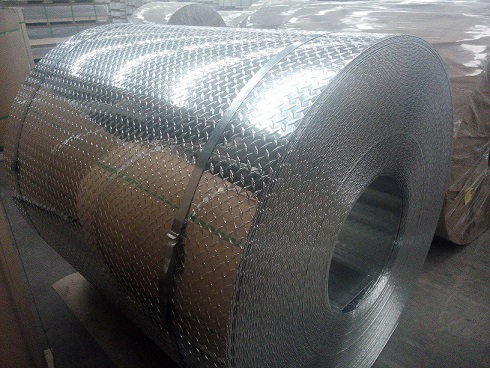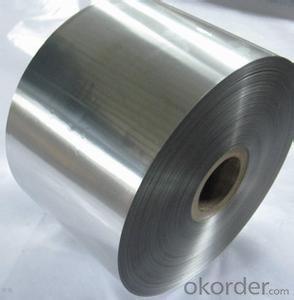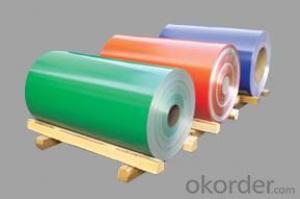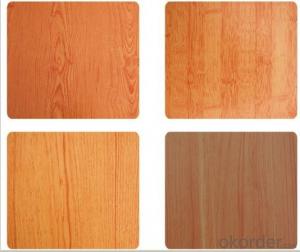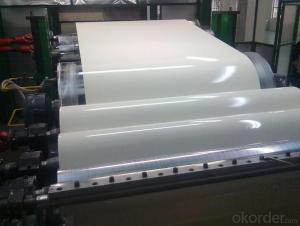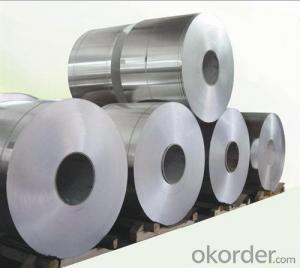Pvc Coated Pattern Aluminum Coil Stock
- Loading Port:
- China Main Port
- Payment Terms:
- TT OR LC
- Min Order Qty:
- -
- Supply Capability:
- -
OKorder Service Pledge
OKorder Financial Service
You Might Also Like
Pointer type pattern roll.Aluminum hard alloy checkered plate: 3003 as the main raw materials, strength slightly higher than ordinary aluminumalloy pattern plate, has a certain anti rust performance.Mainly used for non slip floor and building decoration etc.I produced the thickness range from 1.143mm to 3.175mm, width range from 900mm to 1500mm. The pattern of reinforced high according to the thickness of the aluminum plate was increased from 0.6mm to 1.2mm .3003 alloy. Smooth and bright surface, the pattern for a bar, also known as pointer type. Mainly for export. For export packagingvertical packing seaworthy,Plate thickness 1.143mm, corresponding to the pattern height 0.6mm, plate thickness 1.422mm, corresponding to the pattern height 0.65mm, plate thickness of 1.473 corresponding pattern, height 0.7mm; aluminum thickness 1.60mm,corresponding to the pattern height 0.80mm, plate thickness of 2.0mm, the corresponding pattern height 0.90mm;aluminum thickness 2.54mm, the corresponding pattern height 1.0mm; aluminum thickness 3.0mm
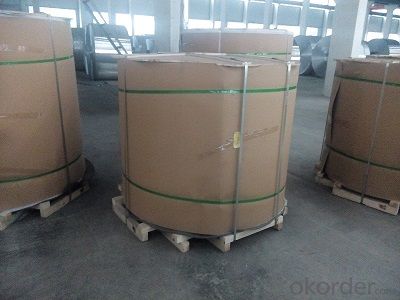
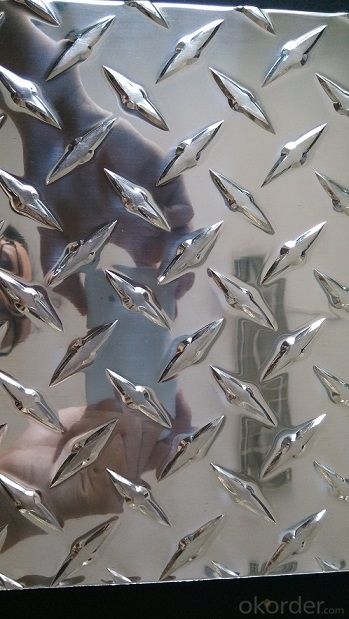
- Q: How long do aluminum coils typically last?
- Aluminum coils typically have a lifespan of around 15 to 20 years. However, the longevity of the coils greatly depends on several factors such as the quality of the aluminum used, the installation process, and the maintenance and care provided. Regular maintenance, such as cleaning the coils and ensuring proper airflow, can significantly extend their lifespan. Additionally, environmental factors like exposure to harsh weather conditions and corrosive substances can also affect their durability. Therefore, while aluminum coils have a decent lifespan, it is essential to provide proper care and maintenance to ensure their longevity.
- Q: Where can I purchase used aluminum coil over the internet?
- <p>Yes, you can buy used aluminum coil online. There are various online platforms and marketplaces where you can find used aluminum coils for sale. Websites like eBay, Alibaba, and specialized metal trading platforms often list used aluminum coils. Additionally, you can check with local recycling centers or metal suppliers who may have used aluminum coils available. Always ensure to verify the condition, specifications, and authenticity of the product before making a purchase.</p>
- Q: Is it possible to utilize aluminum coil in the welding process?
- <p>Yes, aluminum coil can be used for welding. It is commonly used as a filler material in processes like MIG (Metal Inert Gas) welding, where it is fed continuously into the weld pool to create a joint. Aluminum welding requires specific techniques and equipment due to its high thermal conductivity and the need to prevent oxidation. The aluminum coil must be of high quality and clean to ensure a strong, corrosion-resistant weld.</p>
- Q: I can't figure out what the metabolic role of aluminum is. Been searching for a while and can't seem to find anything concrete.If you can, please include sources. Thanks!
- I okorder /
- Q: What are the potential applications of brushed aluminum coils?
- Brushed aluminum coils have a wide range of potential applications across various industries. The distinct brushed finish of these coils makes them an attractive choice for both aesthetic and functional purposes. Here are some potential applications: 1. Architectural applications: Brushed aluminum coils can be used in architectural projects such as building facades, interior wall cladding, and decorative elements. The brushed finish adds a sleek and modern look, enhancing the overall design of the structure. 2. Automotive industry: Brushed aluminum coils can be used in the automotive industry for various purposes. They can be used for interior trim, such as dashboard panels, door handles, and decorative accents. The brushed finish adds a luxurious touch to the interior of vehicles. 3. Electronics and appliances: These coils can be used in the manufacturing of electronic devices and appliances. They are commonly used for the production of laptop casings, smartphone covers, and household appliances like refrigerators, ovens, and microwave panels. The brushed finish provides a stylish and durable surface. 4. Signage and displays: Brushed aluminum coils are often used in signage and display applications. They can be used for creating outdoor and indoor signs, channel letters, and exhibition displays. The brushed finish gives these signs a professional and eye-catching appearance. 5. Furniture and interior design: Brushed aluminum coils can be utilized in the furniture industry for various purposes. They are commonly used for creating furniture pieces like tables, chairs, and cabinets. The brushed finish adds a contemporary and sophisticated touch to the furniture design. 6. Packaging industry: Brushed aluminum coils can also find applications in the packaging industry. They can be used for packaging of high-end products like perfumes, cosmetics, and premium food items. The brushed finish gives the packaging a premium and luxurious appearance. 7. Industrial applications: These coils can be used in various industrial applications, such as manufacturing equipment, machinery, and industrial tools. The brushed finish provides durability, corrosion resistance, and a professional appearance. Overall, the potential applications of brushed aluminum coils are vast and diverse. From architecture to automotive, electronics to furniture, and packaging to industrial sectors, their versatility, durability, and aesthetic appeal make them a popular choice in multiple industries.
- Q: Can aluminum coils be used in high-altitude environments?
- Indeed, the utilization of aluminum coils is feasible in high-altitude settings. Thanks to its lightweight and resistance to corrosion, aluminum is a fitting material for various purposes, including in high-altitude scenarios. Aluminum coils are often employed in air conditioning systems, heat exchangers, and refrigeration units, all of which can operate efficiently at high altitudes. The high strength-to-weight ratio of aluminum enables it to endure the harsh conditions encountered at high altitudes, encompassing low temperatures, strong winds, and low atmospheric pressure. Moreover, aluminum is non-magnetic, providing an advantage in specific high-altitude applications like aerospace and satellite technologies. Additionally, aluminum exhibits exceptional thermal conductivity, facilitating efficient heat transfer and rendering it perfect for deployment in cooling systems functioning in high-altitude environments. Its resistance to corrosion also ensures durability and the ability to withstand the impact of moisture, which can be prevalent in such settings. All in all, owing to their lightweight nature, resistance to corrosion, thermal conductivity, and strength, aluminum coils serve as a dependable and appropriate choice for utilization in high-altitude environments.
- Q: I want to roll aluminum rolls and operate the machine for more than three years
- (3) the suspension with pay during the period of nursing by the unit responsible during the period of hospitalization; (4) the food allowance according to the standard issued by injured workers
- Q: What are the applications of aluminum coils?
- Due to their unique properties and versatility, aluminum coils find wide-ranging applications in various industries. The construction industry is one major field where these coils are extensively used. They are lightweight, durable, and resistant to corrosion, making them suitable for roofing, siding, and insulation purposes. Additionally, aluminum coils are commonly employed in the production of gutters, downspouts, and ventilation systems for buildings. In the automotive sector, aluminum coils are utilized for manufacturing different components like heat shields, radiators, and condensers. The lightweight nature of aluminum makes it an ideal choice for enhancing fuel efficiency and reducing the overall weight of vehicles. Moreover, aluminum coils are employed in the production of heat exchangers and air conditioning systems in automobiles. The packaging industry also heavily relies on aluminum coils. They are commonly used to manufacture beverage cans, food containers, and packaging materials. Aluminum's high ductility and excellent formability make it a preferred material for producing these products. Additionally, aluminum coils act as a barrier against moisture, light, and oxygen, ensuring the preservation and protection of the packaged contents. In the electrical and electronics industry, aluminum coils find a crucial application. They are utilized in the production of transformers, power distribution systems, and electrical conductors. The high electrical conductivity and low density of aluminum make it advantageous for these purposes. Furthermore, aluminum coils are employed in the manufacturing of appliances such as refrigerators, air conditioners, and washing machines. They are also utilized in the production of furniture, decorative items, and various consumer goods. In conclusion, aluminum coils have vast and diverse applications in industries ranging from construction and automotive to packaging, electrical, and consumer goods. The combination of lightweight, durability, corrosion resistance, and excellent formability make aluminum coils an indispensable material in numerous sectors.
- Q: How do you store and transport aluminum coils?
- Aluminum coils are typically stored and transported in a variety of ways depending on their size and weight. They are commonly stored in warehouses or outdoor yards, either horizontally on racks or vertically on stands. To prevent damage and ensure stability, aluminum coils are often stacked securely and separated by wooden blocks or spacers. When it comes to transportation, aluminum coils are usually loaded onto flatbed trucks or shipping containers. They may be secured with straps or chains to prevent movement during transit and to ensure their safe delivery to the desired destination.
- Q: How are aluminum coils coated or treated for specific applications?
- Aluminum coils are coated or treated in various ways to cater to specific applications. One common method is the application of a protective coating, such as a polymer or paint, to enhance durability and resist corrosion. This coating is typically applied through a process called coil coating, where a thin layer of coating material is evenly spread on the surface of the aluminum coil. The coil coating process involves several steps. First, the aluminum coil is cleaned to remove any impurities or contaminants. This step is crucial as it ensures proper adhesion of the coating to the metal surface. After cleaning, the coil is treated with a chemical pre-treatment to enhance the bonding between the aluminum and the coating material. Once the pre-treatment is completed, the coil is fed through a coating machine where the coating material is applied. The coating material can be a liquid paint, a powder coating, or even a thin film. The choice of coating material depends on the specific application requirements, such as desired appearance, durability, or chemical resistance. After the coating is applied, the coil goes through a curing process, which can involve baking the coil at high temperatures or exposing it to ultraviolet light. This curing process ensures that the coating material properly adheres to the aluminum surface, providing excellent protection and longevity. In addition to protective coatings, aluminum coils can also undergo other treatments for specific applications. For instance, they can be anodized, a process that creates a thick, durable oxide layer on the surface of the aluminum. Anodizing enhances corrosion resistance, improves aesthetics, and can also provide a base for further coatings or treatments. Furthermore, aluminum coils can be laminated with other materials for specific applications. For example, they can be laminated with plastic films or adhesive coatings to provide insulation, moisture resistance, or other special properties. In summary, aluminum coils are coated or treated for specific applications by applying protective coatings, such as polymer or paint, through processes like coil coating. Additional treatments like anodizing or lamination with other materials may also be employed depending on the desired properties and requirements of the application.
Send your message to us
Pvc Coated Pattern Aluminum Coil Stock
- Loading Port:
- China Main Port
- Payment Terms:
- TT OR LC
- Min Order Qty:
- -
- Supply Capability:
- -
OKorder Service Pledge
OKorder Financial Service
Similar products
Hot products
Hot Searches
Related keywords
